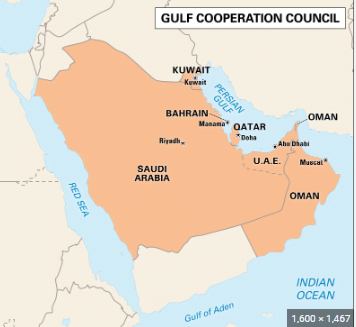International Relations
Context: Despite the Gulf region being home to the largest Indian expatriate community with long-standing relations, its enormous economic potential remains unexplored.
- India is currently facing a trade deficit with Gulf Cooperation Council (GCC) nations.
- India’s trade deficit with GCC soared from $13.4 billion in 2016-17 to $66.8 billion in 2021-22.
- Mutually beneficial trade pact with GCC may become the solution to India’s current deficit problem.
About GCC:
- The Cooperation Council for the Arab States of the Gulf, known as the Gulf Cooperation Council (GCC), is a regional and economic union established in 1981.
- Members: Bahrain, Kuwait, Oman, Qatar, Saudi Arabia, and the United Arab Emirates
- Headquarters: Riyadh, Saudi Arabia.
- The official language is Arabic.
- It aims to achieve unity among its members based on their common objectives and their similar political and cultural identities, which are rooted in Arab and Islamic cultures.
- Out of 32 million non-resident Indians (NRIs), nearly half are estimated to be working in GCC countries.
- According to World Bank, India got $87 billion in foreign remittances in 2021.
- A noticeable portion came from the GCC nations.
India- Gulf Cooperation Council (GCC)

Significance of GCC:
- GCC provides for India’s energy security, while India ensures their food security.
- India and the GCC need to go beyond the traditional Free Trade Agreement (FTA) and include investments and services as a part of a comprehensive economic partnership.
- Under the Comprehensive Economic Partnership Agreement (CEPA), Indian merchandise got preferential market access to the UAE on over 97 % of its tariff lines accounting for 99 % of India’s exports to the UAE in value terms largely for labour-intensive exports.
- Early and effective implementation of CEPAs will provide a boost to India and GCC countries.
- The GCC pact aims to boost economic ties between the two regions.
- This pact can help India to balance the trade deficit with GCC countries and will provide a market for Indian exports.
Economic and Commercial Relations
- India’s old, historical ties with the GCC States, coupled with increasing imports of oil and gas, growing trade and investment, and the presence of approximately 6.5 million Indian workers in the region, are of vital interest to India.
- The Gulf countries provide an excellent market potential for India’s manufactured goods and services, especially in project services exports.
- Around 10 million Indians live across the Gulf, sending remittances of about $45 billion annually on average, according to certain estimates.
- According to a World Bank report, India was the largest recipient of remittances in the world in 2021, receiving around $87 billion, approximately 50 percent of which came from the Gulf.
- According to India’s Ministry of Commerce showed that India’s exports to the GCC countries in 2021-22 increased to about USD 44 billion as against USD 27.8 billion in 2020-21, a growth of over 58 percent.
- This accounted for 10.4 percent of India’s total exports in 2021-22.
- On the import front, India witnessed a rise of 85.8 percent compared to 2020-21, with total imports summing up to USD 110.73 billion, accounting for 18 percent of India’s total imports.
Strategic Relations: From a strategic point of view, India and GCC share the goal of political stability and security in the region.
- The common political and security concerns of India and GCC include cross-border terrorism in the Gulf region and South Asia.
- The emerging common security perceptions create further opportunities for GCC-India cooperation in the future.
- The GCC States are going through important changes and transformations; the process of understanding and integration is coming of age.
- Along with it the areas for cooperation are also widening beyond investments, trade and commerce, and sharing & development of human resources to security.
- India-GCC Industrial Conference: The first GCC-India Industrial Conference was held in Mumbai in February 2004, the second was held in Muscat in March 2006, the third was held in Mumbai in May 2007 and the fourth was held at King Abdullah Economic City, Jeddah in November 2015.
- India- GCC Free Trade Agreement: India and GCC signed a Framework Agreement for enhancing and developing economic cooperation between the two sides in New Delhi in August 2004.
- Two rounds of talks for finalizing aspects like tariff rules, rules of origin, etc have been held. The India-GCC FTA is under negotiation.
India’s trade with other GCC countries:
- Saudi Arabia:
- At a total volume of USD 42.9 billion in 2021-22, Saudi Arabia was India’s fourth-largest trading partner.
- Imports from Saudi Arabia were the fourth largest at USD 34.1 billion (7%), up 50% from the previous year. Most of it was crude oil.
- It was India’s fifth-largest trading partner in 2021-22 at USD 34.3 billion.
- UAE:
- The UAE was India’s third-largest trading partner in 2021-2022, and the second-largest for both exports (USD 28 billion) and imports (USD 45 billion) when these are counted individually.
- Qatar accounts for 41% of India’s total natural gas imports.
- For Oman, India was the 3rd largest (after UAE and China) source for its imports and the 3rd largest market (after UAE and Saudi Arabia) for its non-oil exports in 2019.
India-Qatar Start-Up Bridge:
- The Vice President launched the “India-Qatar Start-Up bridge” that aims to link the start-up ecosystems of the two countries.
- India has emerged as the 3rd largest ecosystem for startups globally, with over 70,000 registered Startups.
- India is home to 100 unicorns with a total valuation of over USD 300 billion.
Way Forward:
India needs to focus on long-term plans for economic cooperation with GCC, beyond oil, GCC countries are also revolutionizing green energy. India can promote its green hydrogen mission in cooperation with GCC countries. Other projects including renewable energy, higher education, technological innovation, smart cities, and space commerce are the areas GCC and India can diversify their cooperation.
Source: The Hindu











